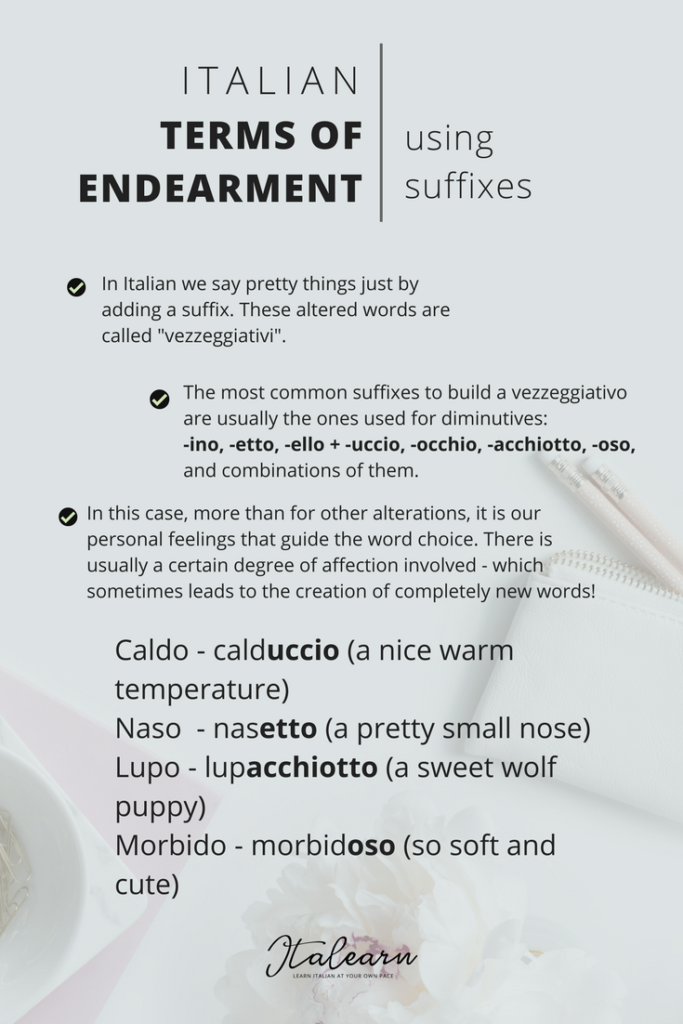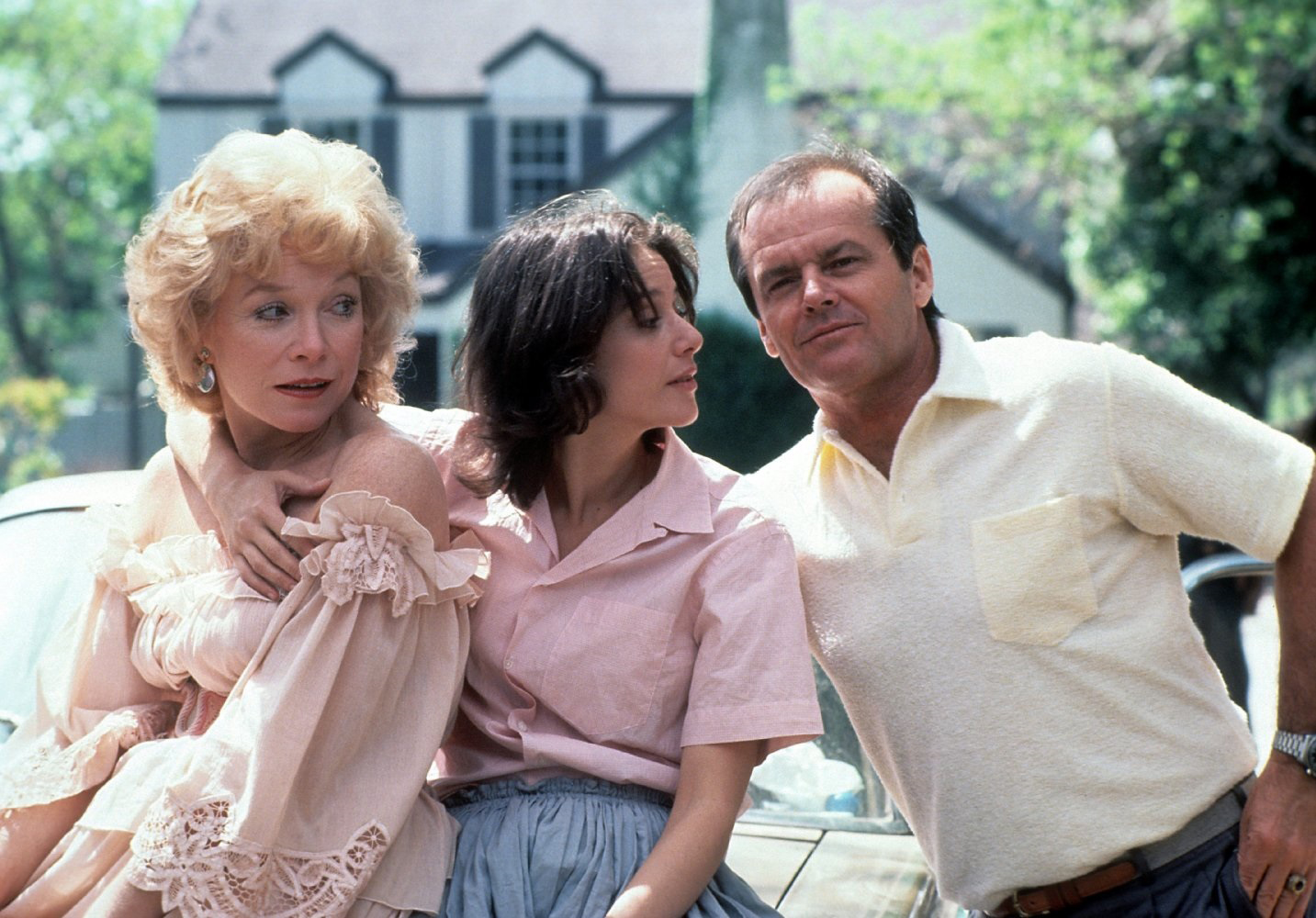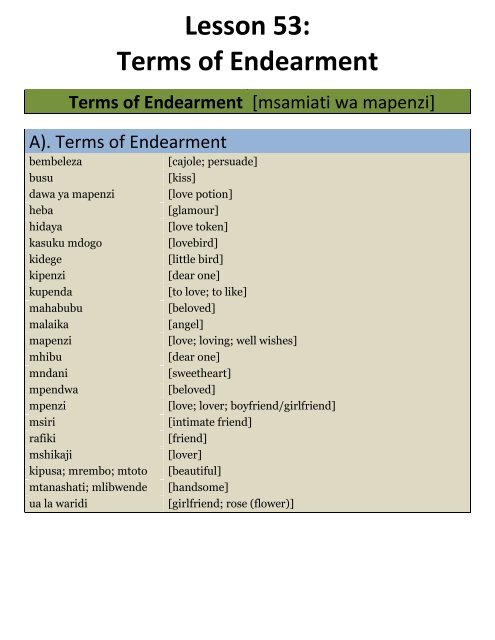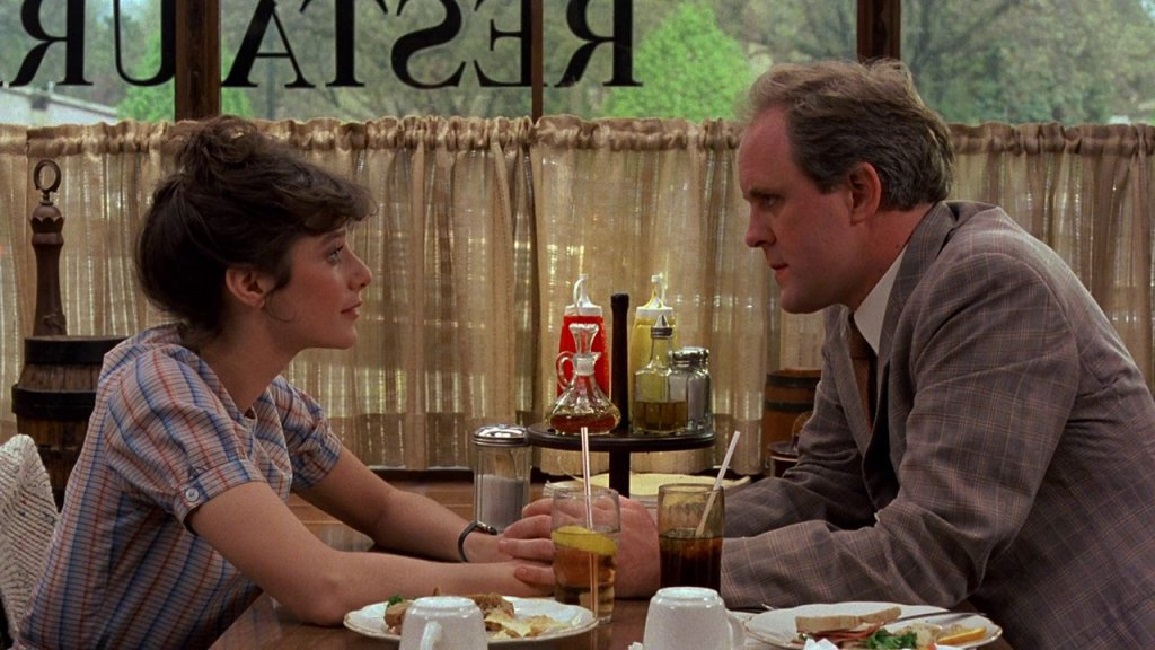There seem to be a variety of languages with pet names, too. In Spain I heard the term "Media Naranja," meaning half-orange, suggesting that the romantic partners are two halves of the whole. The BBC did its own international roundup 2013, which dug up terms like "Chang Noi" in Thai, "Ghazal" in Arabic and several inventive examples from readers. Looking for something else to call your loved ones beside the usual nicknames like sweetie, honey, darling or sweetheart?
Then perhaps we can interest you with their French counterparts; just like mon amourwhich is my love in French! This article lists down 80 French terms of endearment for the special man, woman, or little child in your life. Another popular term of endearment, зайка and any other diminutives of заяц —bunny rabbit—are used when speaking to loved ones, very close friends, and children. Some people also use it with their wider circle of friends and acquaintances, especially the word зая.
Like other languages, Spanish has a long list of terms of endearment you can use to call your loved ones. In this article, let's have a look at the most popular nicknames to express your affection for your male or female sweetheart or your child. My first grade teacher called me Jewels because I was shy but a 'gem to have in class' and a lot of my teachers until 7th grade called me that instead of my actual name.
Because he can be grumpy but loves pie called me space monkey for a while or just sweetiepie. My auntie was nicknamed thumped because she'd sit in a chair on the counter and thump her feet when watching her mom cook. I call her silver lady because of her Halloween cost when I was 3 . I have 4 brothers and learned quickly to give each names so everyone knew I whom I was talking about. The oldest was Brother the second oldest was Monkey my first youngest brother was and still is chubber blubbers, Bubba and Rodeo Clown. And the youngest was Buddy because by that time their was 6 of us and we ran out of creativity.
In 6th grade I got tired of Jewels and started having everyone call me JJ which stands for Jay Jr after my great grandfather. Its the only one that has stuck besides Egg Baby which I've had all my life because I was the baby girl with no hair until she was 3. My favorite has to be Uncle Redneck though because my fairly out spoken great uncle Theodore would call me his favorite little pippy-dancer. I used to dance to a pippy longstocking song on my Nana's record player when I was little with a dresser runner on my head. I use 'beeble' on basically all tiny cute things, and I have been known to call small children 'fella' also, and I've always been fond of the word 'moppet' and 'poppet'.
'bibi' is also used all over the internet (spelled 'bb'), but has disseminated into spoken language now too. Weirdly, my mom used to call me 'killer' (as in 'slow down, killer!'), which I have never heard anywhere but my own family. My maternal grandpa used to call us 'children and other small animals', which isn't exactly a direct term of endearment, but it always tickled me. Then there's the southern terms, like sweetpea and honeylamb etc. Idk if people use this, but I like 'fairycake' too .
I also get called 'tinyshinybeeface' and similar things, again by the husband. Despite having a first name, most people have second names, also known as a nickname given by their loved and dear ones. They are a substitute for the name of a person, mainly used to show love and affection for that person by their near and dear ones. A nickname or a pet name literally means "additional name".
It can be a shortened or modified name of the baby's first name can be a completely different name. Sometimes a nickname can act as a term of endearment and can show the relationship with the person. It underlines the relationship between you and your baby. No, not the 1983 movie starring Jack Nicholson that you probably haven't seen . I'm referring to the affectionate words that people use to address their friends and loved ones, like "sweetheart", "baby", or "honey", "mate", "dude", or "buddy".
Well, I'm not much in the business of giving advice (who am I?), but I can give you opinion and I'd be interested to see what others think about this. They are meant to show affection and love for someone close to you. Though the lady at the check out counter at the grocery store called me "honey" the other day, and that felt kinda weird. I get what your saying that some names just feel right.
My kids are now teenagers, and I've just started calling them chickens. Like, c'mon my little chickens, let's get in the car. There's something to be said for respecting the wishes of the mother, but your daughter sounds rigid indeed.
She's lucky to have a grandmother around to love her 2 year old, and I think there's also something to be said for the wishes of the grandmother. You raised your daughter and now you're giving more love to the next generation. I say call her whatever terms of endearment you like. One of the most common affectionate terms in Russian, солнышко is suitable for informal settings such as addressing close friends and loved ones.
Behind closed doors, everyone has their favorite set of nicknames. French is the language of love, so you know that French pet names and nicknames were going to be quite evocative. Some are cute and romantic, others more unique and nonsensical.
Living in France for 10+ years, I've heard the gamut. We have everything from stuffed toys to farm animals to vegetables as pet names. You can create these nicknames by merging their first and last names, shortening their first name, or by using a quality that describes an aspect of their personality.
People have been calling their sweethearts and dearest friends honey since Shakespeare's time. It wasn't until the mid-1500s that honey became used as a form of address. This sense of honey has stuck, and it is still widely uttered with affection today. We use many terms of endearment – words and phrases to say "I love you" to our loved ones.
'Darling', 'honey', 'sweetheart' and 'dear' are some of the most commonly used words, not only for lovers but also for kids. At times, an entirely unrelated word or phrase may be used. There is quite a lot of political correctness when it comes to the typical situations and popular terms of endearment.
Some terms of endearment are popular in many languages – "baby", "angel", "sweetheart", and 'love", for example. But there are many interestingly local and culture-specific terms. Italian happens to be one of the more expressive languages I've encountered in terms of the sheer variety of pet names that exist. Terms of endearment express affection to everyone we love—to our pets, children, partners, friends, and relatives. Spanish speakers tend to be quite loving and affectionate gente, giving life to an inspiring collection of Spanish terms of endearment that fill the heart with joy. "It's just a human way of expressing love," she says.
Ma puce sounds strange, but it is actually quite a common pet name in French. It can even be said among close friends, unlike some of the others which are usually reserved for partners and children. Some words are clearly derived from each other, such as "sweetheart" and "sweetie", while others bear no etymological resemblance, such as "baby", "babe", and "cutie". "Honey" has been documented as a term of endearment from at least the 14th century. "Baby" was first used in 1839 and "sugar" only appeared as recently as 1930.
This is one of the most common terms of endearment all around the world, and there's a very good reason for this. Loved ones and babies tend to evoke the same kind of emotions in us – we want to care, love for and protect them – we view them as precious. And so the word baby came to be used for lovers too, particularly in the US. Babe is simply a shortening of baby and is heard far more commonly in Britain today. Calling a woman baby can be seen as being condescending, unless it's being used comically or playfully. Unlike the rest of the words above, both babe and baby tend only to be used by couples and not by strangers.
Another term that involves sweetness, sweetheart is used as a term of affection between loved ones and also as a familiar term of address, as in hun or luv. It can be traced all the way back to the 13th Century, where it comes from the Middle English swete hert. As love makes us all giddy, often our hearts beat faster, and so the term swete hert came about to mean a fast beating heart. The term slowly grew into the term sweetheart – often used to address someone who makes your heart throb. At home, I definitely use my kids' names much more often than terms of endearment, so they know their name, and they know me to call them by their name most of the time. And because I switch between so many terms, they don't have one that they're exclusively known as.
It's not like my charge is only 'sweetie', and my godchild is only 'munchkin'. Sometimes, I use a term of endearment with another child I don't know, as well. For instance, the other day, a young child fell off his scooter at the playground, and was sitting there, on the ground, crying and clearly hurt. I waited several seconds for his parent or nanny to respond, but no one came running.
I felt completely wrong about ignoring the child when he so clearly needed some sort of loving attention. So, I went up to him, knelt down beside him, and gently said, "Hey, Sweet Pea, are you alright?" I gently talked to him and just sat there with him until his nanny finally came. Sometimes, also, when my charge is playing with other babies whose names I don't know, I use a term of endearment with them, since we're all interacting. If I learn their names, I always you them, but I rarely learn the names of strange children on the playground. You may even hear some women using the emphatic bellissima towards a good female friend.
You can use Bärchen, the diminutive of bear, to address a spouse, boyfriend, girlfriend, or child. It is also very commonly used by people in same-sex relationships. See our explanation of the diminutive at the end of this article. Schatz and its variations, Schätzchen and Schatzi ("little treasure") is the most common term of endearment in German by far. Almost all German-speaking couples call each other this, and it's also commonly used with children. Normally, you'll hear it reverberate across playgrounds.
A quick search of the literature reveals just how little these issues have been studied scientifically. The evidence that's out there is largely based on a smattering of surveys, which didn't capture an entirely representative sample of forms of love. It doesn't seem like anyone has made any distinctions between heterosexual and homosexual couples with regard to the use of pet names–perhaps it's not relevant? –or compared how pet names are used in the United States versus other countries.
But from what has been studied, and from the experience of several experts, it seems nicknames can be a good thing for a relationship – if both partners are into it. Others have pointed out however that, in an informal setting like a pub, 'the use of terms of endearment here was a positive politeness strategy. A term like "mate", or "sweetie", shifts the focus of the request away from its imposition...toward the camaraderie existing between interlocutors'. A term of endearment is a word or phrase used to address or describe a person, animal or inanimate object for which the speaker feels love or affection. Terms of endearment are used for a variety of reasons, such as parents addressing their children and lovers addressing each other. I decided to draw up a list of all the names I've used or heard my mommy friends use on their kids.
Sometimes the funniest nicknames are slightly pejorative. Whether you call the kids rug rats and ankle biters or sweet cheeks and cherubs sort of depends on the day. Bud used as a shortening of buddy or brother has an entirely different etymology. That particular mode of address popped up in the 1850s as an American colloquialism and is unrelated to the bud first used by Shakespeare. In the mid-1500s, people would flock to bullies rather than run away from them. This is because back in Shakespeare's time, the term bully affectionately referred to a good friend or fellow, or a sweetheart or darling.
Shakespeare, exceedingly fond of this term, used it in several of his plays including Henry V, A Midsummer Night's Dream, The Merry Wives of Windsor and The Tempest. You shouldn't be surprised if parents call their kids 'pumpkin', 'lamb', 'sweet pea' or 'pikaninny' in British English. In Scotland, children are often called as 'bairnie' and in Ireland as 'mhuirnin'.
Teens usually use the words 'lover', 'baby', and 'babes' to express their affection. There are anthropological origins to pet names used in different types of relationships. Relationships are small cultures in themselves and rituals like nicknames and similar private languages reinforce them. Although they play a healthy role in ordinary times, terms of endearment are useful whenever conflicts arise. They allow a natural recourse to playfulness and humor whenever things become rough in relationships. Depending on how close the relationship is, some of the terms listed above for significant others or children may be used for friends, especially among females.
My first choice, Schnucki, has no literal translation in English. It is similar to "sweetie" or "sweetie-pie." It is most common for children, but you can address a partner using it too. It is one of the ten most popular German terms of endearment.
Fisher directed me to researchers at The Kinsey Institute at Indiana University who did a study on "baby talk," or what they call "Loverese," among couples. This refers to the way that people change their voices, often using a higher pitch, when speaking to a romantic partner . This is relevant because it's another example of the special speech unique to particular couples. I have been called a little owl, a swan and even a "panda-fish." No, I'm not a supernatural, shape-shifting creature or a character in a children's storybook. I've just been in a few relationships where cutesy, affectionate nicknames emerged as inside jokes. ' This lesson will introduce you to some of the French words you can use with the people you care about in your life.
Here are the classic and common terms of endearment you hear people use in France. You can say these terms of French endearment to either men , women or children , and in general most of these have the same general meaning as saying sweetie or honey. Your new bae is French and you want to find the perfect French term of endearment for them? Pick from this list of pet names you can call the men, women and children you love. Of course, there's nothing wrong with Buddy, Sport, or Chief.



























